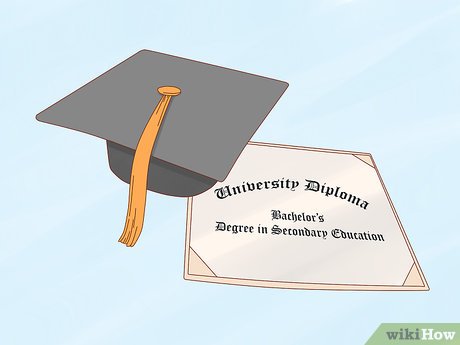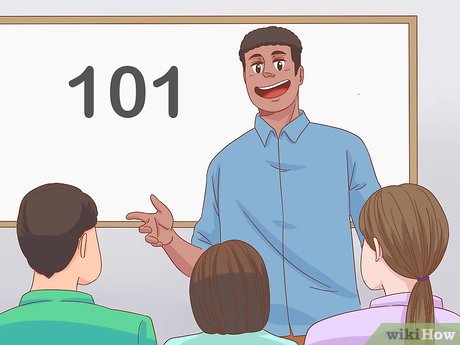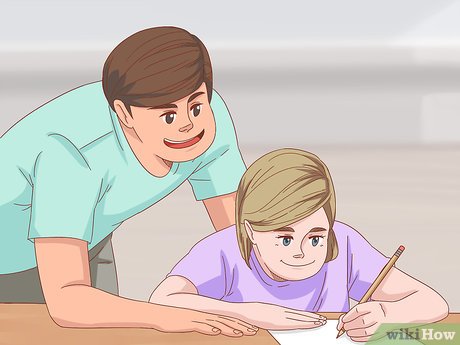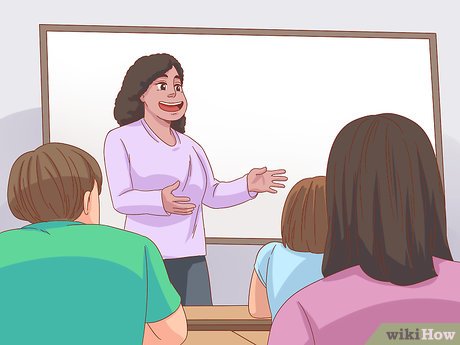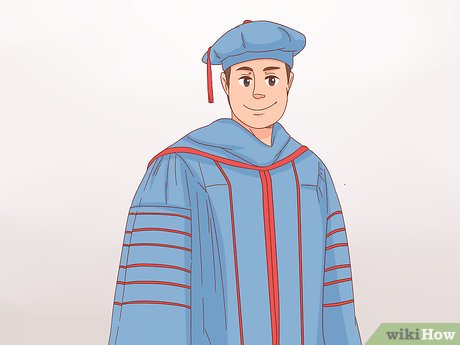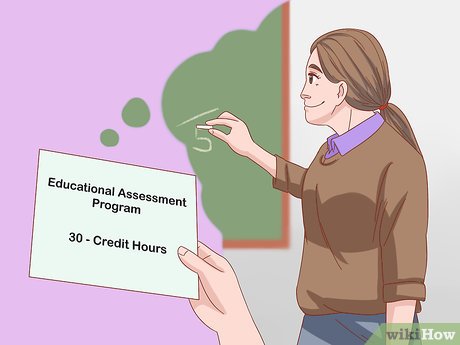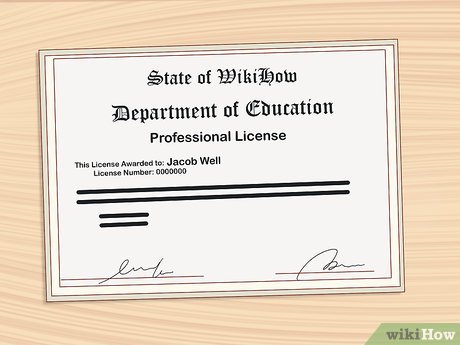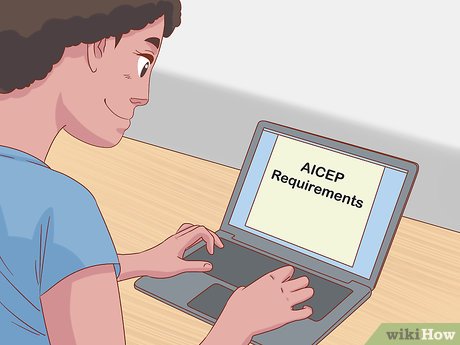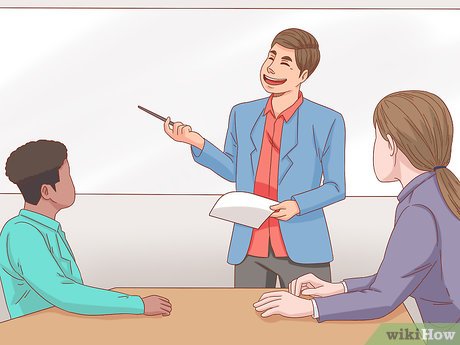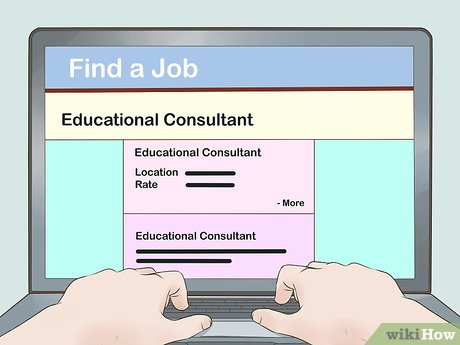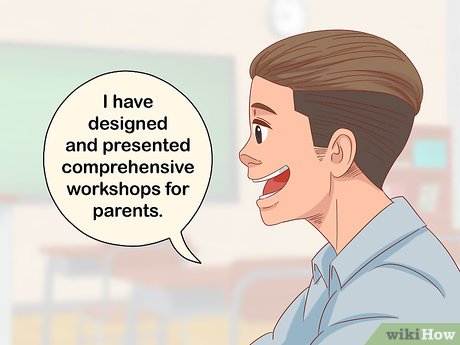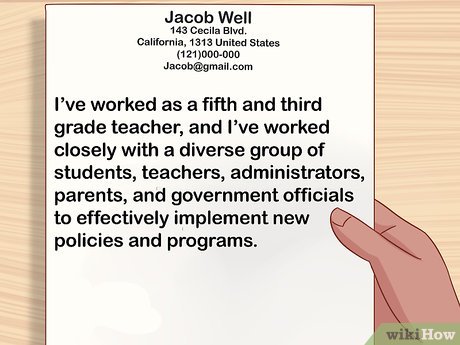How to Become an Educational Consultant
Part 1 of 3:
Becoming Qualified
-
 Earn a bachelor's degree from a four-year college. During undergraduate years, you should choose a major in education. Majors such as elementary education, secondary education, or special education are common choices.[2] Some schools may not offer introductory teaching courses, so you can take online courses to get those credits on your transcript.[3]
Earn a bachelor's degree from a four-year college. During undergraduate years, you should choose a major in education. Majors such as elementary education, secondary education, or special education are common choices.[2] Some schools may not offer introductory teaching courses, so you can take online courses to get those credits on your transcript.[3]- You need to complete a student-teaching semester in your final year of college as a requirement for hands-on experience. All colleges require this to fulfill graduation requirements in an education major.[4]
- In addition to education major requirements, you can interview an educational consultant, volunteer at a social service agency, or work as a counselor for children with disabilities to get insight into their work before you pursue it.
-
 Take introductory teaching classes in college. For aspiring teachers starting as undergrads, colleges offer courses to learn the basics of teaching. Some of these classes will have a hands-on aspect where you can teach lessons to fellow students.[5]
Take introductory teaching classes in college. For aspiring teachers starting as undergrads, colleges offer courses to learn the basics of teaching. Some of these classes will have a hands-on aspect where you can teach lessons to fellow students.[5]- If your campus doesn't offer introductory teaching courses or if your schedule is hectic, you can find teaching classes online.
- You can search your campus's course catalog for teaching classes.
-
 Participate in extracurricular teaching activities. Colleges have a lot of volunteer activities to choose from that include tutoring, teaching, or mentoring school-aged children. This is a wonderful way to get teaching experience as an undergraduate while also providing community service.[6]
Participate in extracurricular teaching activities. Colleges have a lot of volunteer activities to choose from that include tutoring, teaching, or mentoring school-aged children. This is a wonderful way to get teaching experience as an undergraduate while also providing community service.[6]- Some ways to know if an activity focuses on honing your teaching skills is if your role will be referred to as 'teaching' or 'teaching assistant.'
- Working part time at a tutoring agency or as an independent tutor also counts.
- Extracurricular teaching activities may ask for commitments of up to 5 hours per week. It depends on the program offering it.
- Summer teaching internships usually involve teaching in summer school in a K-12 setting. Working at a summer camp for college credit is also an option.[7]
- The activity may require you to make lesson plans just like a professional teacher.
-
 Take a summer teaching internship to get professional experience. Teaching internships take place in a K-12 school setting and are one of the best ways to try out teaching and to gain experience. Internships also allow you to make connections with professionals and potential employers.[8]
Take a summer teaching internship to get professional experience. Teaching internships take place in a K-12 school setting and are one of the best ways to try out teaching and to gain experience. Internships also allow you to make connections with professionals and potential employers.[8]- Internships allow you to apply your education to real world experience while training you in teaching.
- Internships are a good opportunity to learn about yourself, and they encourage personal development. They can help you form, achieve, and understand your goals as an aspiring teacher.
-
 Earn a master's degree in education or a Ph.D. to become a teacher. Before you become an educational consultant, you'll need to establish a career in your school district as an educator. You don't have to receive a degree from a university in that same district. You can receive an M.A., M.S., and M.Ed. with a specialization in educational assessment or evaluation from any university that offers a teaching program.[9]
Earn a master's degree in education or a Ph.D. to become a teacher. Before you become an educational consultant, you'll need to establish a career in your school district as an educator. You don't have to receive a degree from a university in that same district. You can receive an M.A., M.S., and M.Ed. with a specialization in educational assessment or evaluation from any university that offers a teaching program.[9]- As an educational consultant, you'll work with diverse audiences, so you should have a concentration in positive reinforcement, psycho-educational assessment, evaluation of students with disabilities, applied behavior analysis, intelligence testing, special education, or human development.[10]
Part 2 of 3:
Getting Licensed as an Educational Consultant
-
 Earn 30 credit hours in an educational assessment program or school psychology program.[11] This is a general guideline, so you should call the university where you're going to get certified to find out their specific requirements. For example, the University of California, Irvine has an independent educational consultant certification program, and a schedule of their classes is listed on the program page. You should do this after you've been teaching professionally for at least 3 years.[12]
Earn 30 credit hours in an educational assessment program or school psychology program.[11] This is a general guideline, so you should call the university where you're going to get certified to find out their specific requirements. For example, the University of California, Irvine has an independent educational consultant certification program, and a schedule of their classes is listed on the program page. You should do this after you've been teaching professionally for at least 3 years.[12]- Two main contacts for their educational consultant program are listed on the side of the webpage. Call them for specific information about certification requirements.
-
 Get a state teaching license. Teaching license requirements vary by state, so you need to decide what state you'll be teaching in. For the most part, all states require a basic skills test for math, reading and writing. You will also need to take a subject area knowledge test, as well as submit to a fingerprint and background check.[13]
Get a state teaching license. Teaching license requirements vary by state, so you need to decide what state you'll be teaching in. For the most part, all states require a basic skills test for math, reading and writing. You will also need to take a subject area knowledge test, as well as submit to a fingerprint and background check.[13]- When you are ready to submit documentation to your state certifying agency, speak to a staff member of your teaching preparation program for details on how and when to apply for your license.
-
 Teach professionally for at least 3 years. This can be in a K-12 environment or with special education students. Being an adjunct professor at a college or university also counts as professional teaching experience.[14] You can also teach at an at-risk school or a private school.[15]
Teach professionally for at least 3 years. This can be in a K-12 environment or with special education students. Being an adjunct professor at a college or university also counts as professional teaching experience.[14] You can also teach at an at-risk school or a private school.[15]- Being an ESL instructor, lecturer, or preschool teacher also amounts to teaching experience.[16]
-
 Apply for certification through education consultant organizations. Read the program requirements before applying for certification to make sure you've fulfilled all the educational and professional prerequisites for certification.[17]
Apply for certification through education consultant organizations. Read the program requirements before applying for certification to make sure you've fulfilled all the educational and professional prerequisites for certification.[17]- Universities with education consulting programs include, but are not limited to, the UC Irvine Program, UCLA Program, and the UC Berkeley Program. You can apply to these programs on their websites.[18]
- You may acquire educational consultant certification through the American Institute of Certified Educational Planners (AICEP), as well as other organizations.[19]
- The application process requires an assessment of the candidate's expertise, education, training, and professional activities.
- Candidates will also take a written assessment to test their ability to understand students' needs and recommend colleges for students.
-
 Choose a specialization ahead of time. Some educational consultants prepare students to make the transition from high school to college, while others help students with the college selection and admissions process. Others specialize in filling out financial aid applications or preparing students for college admissions exams.[20]
Choose a specialization ahead of time. Some educational consultants prepare students to make the transition from high school to college, while others help students with the college selection and admissions process. Others specialize in filling out financial aid applications or preparing students for college admissions exams.[20]- Many educational consultants work freelance as independent contractors hired by parents, but some work for firms or are hired by school districts or colleges.
-
 Attend workshops and professional development classes. As an educational consultant, you need to be up to date on current learning tools that can be implemented in classrooms and how those tools can be used by teachers to educate students on all levels.[21]
Attend workshops and professional development classes. As an educational consultant, you need to be up to date on current learning tools that can be implemented in classrooms and how those tools can be used by teachers to educate students on all levels.[21]- You can learn about these opportunities from organizations such as SOPHIA, Atomic Learning, and Scholastic.
Part 3 of 3:
Finding a Job
-
 Apply for an educational consultant job. Search educational consultant job postings online and read through their descriptions and requirements until you find one that fits your niche as a consultant. If you have experience developing educational programs, improving the use of technology in classrooms, and clerical duties, then you should look for consultant jobs with those requirements.[22]
Apply for an educational consultant job. Search educational consultant job postings online and read through their descriptions and requirements until you find one that fits your niche as a consultant. If you have experience developing educational programs, improving the use of technology in classrooms, and clerical duties, then you should look for consultant jobs with those requirements.[22]- Job postings list requirements for educational consultants, such as coordinating counseling and testing, improving curricula, improving technology usage in classrooms, keeping career and educational development opportunities up to date, clerical duties, and promoting educational programs.
-
 Discuss your academic experience when you apply for a job. When applying and being interviewed by a potential employer, you should tie your experiences as a college student and as a teacher together so that they are relevant to the job you're applying for. Talk about what relevant teaching you have or extracurricular activities you participated in as a student.[23]
Discuss your academic experience when you apply for a job. When applying and being interviewed by a potential employer, you should tie your experiences as a college student and as a teacher together so that they are relevant to the job you're applying for. Talk about what relevant teaching you have or extracurricular activities you participated in as a student.[23]- Highlight your most relevant job and educational experience in your resume.
- In your cover letter or job interview, talk about how you may have organized an academic conference or lecture series on your campus. Demonstrate that you promoted the event and put it all together. This experience will reflect your organizational skills.
- For instance, in a cover letter, you could say 'As an educational consultant, one of my greatest strengths is curriculum development and assessment.'[24]
- If you worked on a committee or in student government, use that to reflect your ability to deal with multiple tasks and personalities. This also shows off your organizational skills.
-
 Emphasize your administrative experience, if applicable. If you show the employer that you have the skills to delegate tasks to people who can carry them out, you'll give the impression that you can get a project done.[25]
Emphasize your administrative experience, if applicable. If you show the employer that you have the skills to delegate tasks to people who can carry them out, you'll give the impression that you can get a project done.[25]- Examples of administrative work could be work in your department or your experience putting together a dissertation committee.
- For example, state that you, 'Designed and presented comprehensive workshops for parents, and collaborated with educators to create effective instructional materials.'[26]
-
 Discuss your teaching experience in a cover letter or interview. Teaching shows your ability to present complicated matters to diverse audiences. In your cover letter, explain in detail what you have done in your previous positions.[27]
Discuss your teaching experience in a cover letter or interview. Teaching shows your ability to present complicated matters to diverse audiences. In your cover letter, explain in detail what you have done in your previous positions.[27]- For example, you can write in a cover letter, 'I've worked as a fifth and third grade teacher, and I've worked closely with a diverse group of students, teachers, administrators, parents, and government officials to effectively implement new policies and programs.'[28]
- Talk about what you learned early on as a teaching assistant and how that helped you in your career as a teacher or college professor.
- In a cover letter, discuss your goals as an educational consultant.[29]
- Describe what you've been doing up through your present job. Write about your experience implementing new policies or programs in your school district, what you've accomplished as an educator, if you have curriculum development experience, and so on.
Share by
Samuel Daniel
Update 24 March 2020
